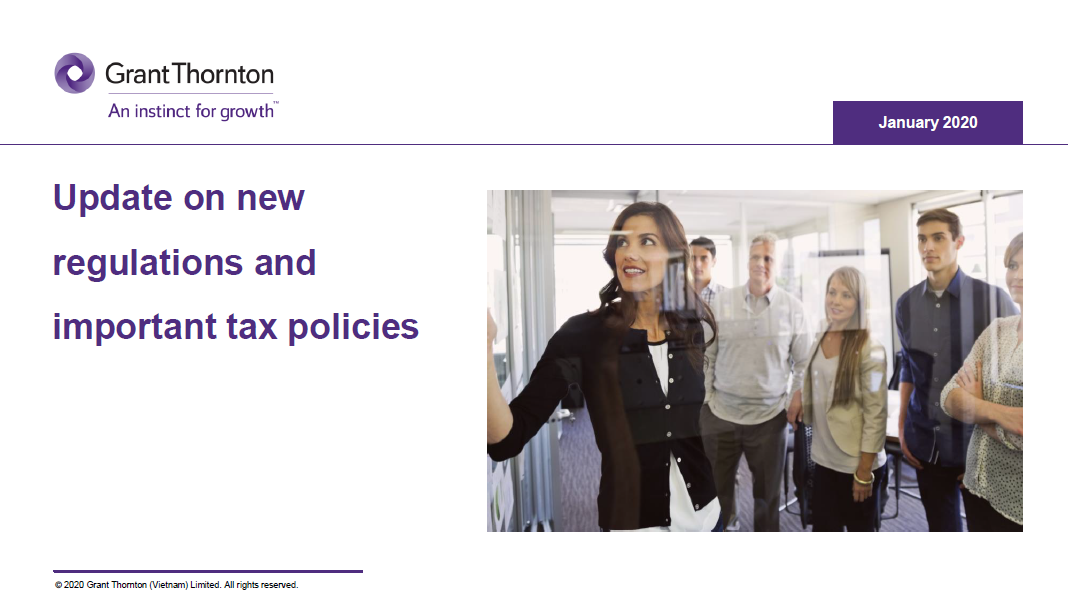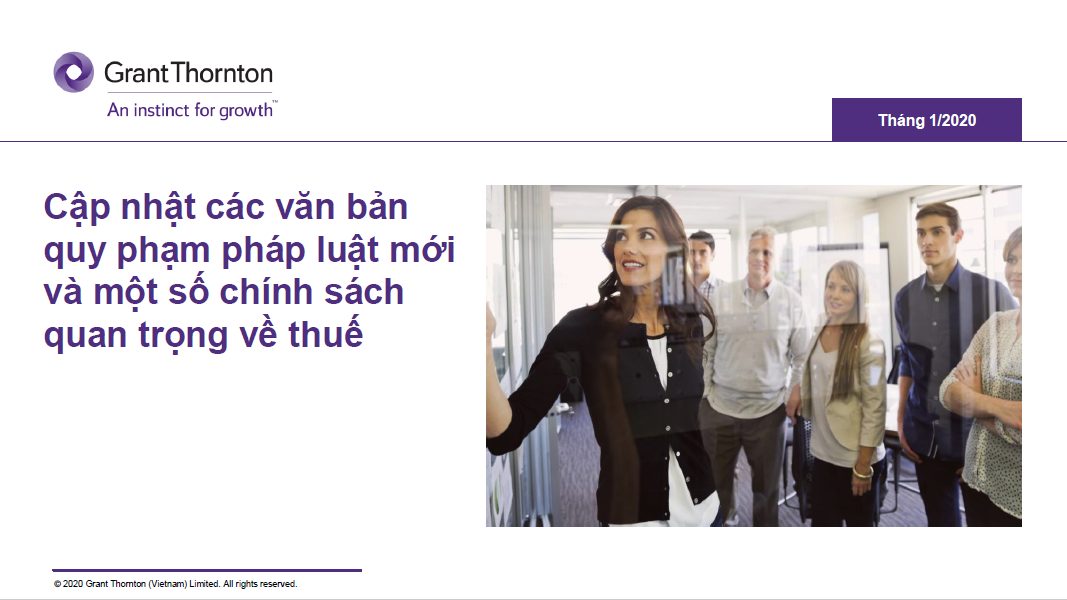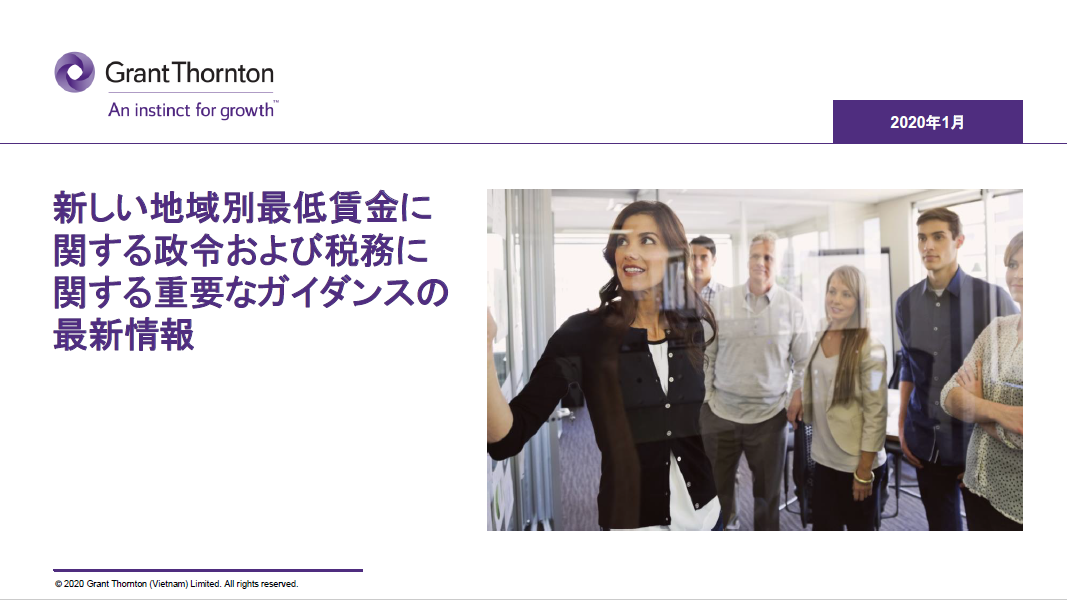-
International Financial Reporting Advisory Services
IFRS reporting advisory serivces of Grant Thornton are carried out by our dedicated team with expertise in IFRS implementation.
-
Audit Services
• Statutory audit • Review of financial statements and financial information • Agreed-upon procedures • FRAS services • Compilation of financial information • Reporting accountant • Cross-border audit • US GAAP audit
-
Audit Quality
We have various methods of monitoring our system of quality control and engagement quality, including real-time involvement of coaches and national office personnel on select audit engagements, reviews of issuer audit engagements prior to archiving by someone outside of the engagement team, and internal inspections of assurance engagements and the system of quality control.
-
Audit Approach
Audit Approach
-
Licensing services
Licensing services
-
International tax planning
Our extensive international network provides us with significant resources to meet all your expansion goals. We strive to develop commercially focused and tailored tax strategies to minimise tax exposures and maximise business efficiency.
-
Expatriate tax planning
We have a broad knowledge base and skills to assist you keep your personal income taxes to a legitimate and reasonable level, while remaining compliant with legislation. We can develop a personalised package for each key employee to take maximum advantage of the exemptions and incentives available.
-
Tax advisory
We will review the proposed business model and transactions and advise on tax implications and recommendations to optimize the tax opportunities under the local regulations and treaties which Vietnam entered into. Furthermore, we coordinate with our GT global tax team to provide a comprehensive tax advisory for the countries involved in the business model and transactions.
-
Tax compliance services
This service is designed to assist enterprises to cope with the statutory tax declaration requirements in line with the Vietnamese tax laws as well as the frequent changes and updates in tax laws.
-
Tax health check
Our Tax Health Check involves a high-level review of specific tax areas to highlight the key issues that need to be rectified in order to reduce tax risks. Through our extensive experience, we have identified key risk areas in which many enterprises are not fully compliant or often overlook potential tax planning opportunities. Our tax health check service represents a cost-effective method to proactively manage risks and reduce potential issues arising as a result of a tax inspection.
-
Transfer Pricing
Transfer pricing is a pervasive tax issue among multinational companies. In Vietnam, the tax authorities require special documentation to report related party transactions. Compliance with transfer pricing regulations is an important aspect of doing business effectively in Vietnam as failure to do so may result in significant penalties.
-
Tax due diligence
We conduct tax due diligence reviews of target companies to analyse their tax exposure and position in relation to acquisitions, mergers or consolidations. We are able to integrate this service with our Advisory Services department in order to offer a comprehensive, holistic due diligence review.
-
Customs and international trade
Our experienced professionals can help you manage customs issues more effectively through valuation planning and making use of available free trade agreements. We also assist Clients in optimising their customs procedures by making use of potential duty exemptions and efficient import-export structures. Risk mitigation activities include customs audit defense and compliance reviews.
-
M&A Transaction
We advise numerous foreign investors on efficient tax structures for their investments. Our experience allows you to consider all the options and set up a corporate structure that meets both operational and tax efficiency requirements. In short, the structure that is best for you.
-
Industrial Zones – Picking A Location For Your Business
Grant Thornton Vietnam’s one-stop services are designed to provide comprehensive support to both new and current investors who are planning to expand or restructure their business in Vietnam. Our professionals have established strong working relationships with landlords, property developers and authorities at various localities. With extensive experiences in liaison with the relevant agencies, we offer assistance including negotiation on land rental rates and efficient management of licensing process. Our customized and flexible solutions can bring benefits of cost efficient location, accelerate licensing process, and optimize tax opportunities while remaining in compliance with legislation.
-
Tax Audit Support
Tax audit support services provide comprehensive assistance to your business in Vietnam. Recent tax practices have shown the general tendency of launching routine tax audit on yearly basis. Tax authorities have been effectively using more sophisticated methods to identify target entities from across different industry sectors.
-
Business Risk Services
Business Risk Services
-
Transaction Advisory Services
Transaction Advisory Services
-
Valuation
Valuation
-
Business consulting services
Finance Management Advisory
-
Accounting services
Accounting services
-
Taxes compliance within outsourcing
Taxes compliance within outsourcing
-
Payroll, personal income tax and labor compliance
Payroll, personal income tax and labor compliance
-
Secondments/Loan staff services
Secondments/Loan staff services
-
Compilation of the financial and non-financial information
Compilation of the financial and non-financial information
-
Accounting systems review and improvement
Accounting systems review and improvement
-
Initial setting-up for accounting and taxes systems
Initial setting-up for accounting and taxes systems
-
Management accounting and analysis
Management accounting and analysis
-
Comprehensive ERP system solution
ERP software is a tool for business operations, production management, order processing and inventory in the business process. Today, ERP software for small and medium businesses has been greatly improved to help businesses manage their business better. The article below will answer all relevant information about what ERP software is and offer the most suitable ERP solution for businesses. Let's follow along!
-
Analyze Business Administration data
We believe in the value that data can bring to the success and development of every business. Our team helps design data architecture supported by tools, to support business governance and provide useful information to management.
-
Financial reporting compliance solution package
Putting financial issues at the heart, this service helps ensure that financial reports for customers comply with both the requirements of Vietnamese accounting regulations and standards (VAS) as well as reporting standards. international finance (IFRS).
-
Third-party ERP extensions
ERP is a long-term solution that requires long-term travel, not short-term. We understand that many businesses cannot deploy the entire ERP system at once due to many different reasons, instead businesses can deploy each part. Over time, these solutions can be expanded to accommodate improved business processes or can even link completely new processes across different departments.
-
Localize, deploy and rebuild the project
Quite a few ERP projects need to be implemented according to current Vietnamese requirements and regulations, but still comply with common international business requirements. These projects need some improvements and adjustments in the right direction.
-
Consulting on technology solutions
We support the selection and implementation of the most suitable solutions, ensuring business efficiency and performance. We will work closely with customers to plan, evaluate and implement the right technology investment strategies and solutions to meet the development needs of businesses.

-
Offshore company establishment service
Using the offshore company model will facilitate the owner in the process of transaction and expand overseas markets, take advantage of the tax policy with many incentives and protect the value of the family enterprise's assets.
-
Private Trust Advisory
The development of the economy with many modern financial instruments has brought many advantages and opportunities for the enterprises, but there are still certain potential risks in any type of business. So how to protect your asset value with an appropriate company structure while stay compliance with relevant regulations?
-
Our values
We have six CLEARR values that underpin our culture and are embedded in everything we do.
-
Learning & development
At Grant Thornton we believe learning and development opportunities help to unlock your potential for growth, allowing you to be at your best every day. And when you are at your best, we are the best at serving our clients
-
Global talent mobility
One of the biggest attractions of a career with Grant Thornton is the opportunity to work on cross-border projects all over the world.
-
Diversity
Diversity helps us meet the demands of a changing world. We value the fact that our people come from all walks of life and that this diversity of experience and perspective makes our organisation stronger as a result.
-
Contact us
Contact us
-
Available positions
Experienced hires
-
Available positions
Available positions
1. Regional minimum wages in 2020 increased since 01 January 2020
On 15 November 2019, the Government issued Decree No. 90/2019/ND-CP, replacing Decree No. 157/2018/ND-CP of November 15, 2018, setting the regional minimum wage for employees working under labor contracts. Accordingly, from 1 January 2020, the regional minimum wage will increase by VND150 - 240,000 per month compared to prevailing regulation:
The corresponding increase in each region is as follows:
- Region I: from VND 4,180,000 to VND 4,420,000 / month;
- Region II: from VND 3,710,000 to VND 3,920,000 / month;
- Region III: from VND 3,250,000 to VND 3,430,000 / month;
- Region IV: from VND 2,920,000 to VND 3,070,000 / month.
The area of regional minimum wage is specified in the list attached to the appendix of Decree No. 90/2019/ND-CP.
The regional minimum wage is the lowest which serves as a basis for enterprises and employees to discuss and pay salary, in which the salary paid to employees working in normal working conditions, ensuring sufficient time to work normally in the month and completing the work norms or agreed scope of work. For employees doing jobs that require workers to pass vocational training, the agreed wage must be at least 7% higher than the regional minimum wage level above.
According to current regulations, the cap of unemployment insurance contributions is 20 times of the regional minimum wage, so enterprises should pay attention to increase the contribution rate (if necessary) and calculate unemployment insurance at the new corresponding rate as above if the employee's salary exceeds the cap.
2. Official Letter No. 4178/TCT-CS introducing certain contents of Circular No. 68/2019/TT-BTC
On 15 October 2019, the General Department of Taxation issued Official Letter No. 4178/TCT-CS briefly introducing some key contents of the newly issued Circular No. 68/2019/TT-BTC. Enterprises need to refer to this official letter together with the contents of Circular No. 68 to get an overview of the main contents of the current regulations on electronic invoices.
3. Official Letter No. 4707/TCT-CS on compulsory use of new electronic invoices when directly requested by tax authorities
On 18 November 2019, the General Department of Taxation issued Official Letter No. 4707/TCT-CS on electronic invoices to some local tax departments.
Accordingly, the Government's Decree No. 119/2018/ND-CP in 12 September 2018, takes effect from 1 November 2018. During the transition period from 1 November 2018 to 31 October 2020, if the tax authority has not notified the enterprises about the conversion to use electronic invoices according to Decree No. 119/2018/ND-CP, they can still use invoices according to the old regulations under Decree No. 51/2010/ND-CP and circulars, documents guiding the implementation.
As such, enterprises only have to convert to use electronic invoices in accordance with Decree No. 119/2018/ND-CP when required by the tax authorities during this transition period.
It should be noted that when an enterprise issue invoices in the old form, they must issue those invoices at the correct time as prescribed in Clause 2, Article 16 of Circular No. 39/2014/TT-BTC with full of compulsory contents (including electric signature) as per Article 6, Circular No. 32/2011/TT-BTC.
In case the enterprise has converted to a new electronic invoice form, the enterprise must make invoice in time and with all compulsory contents as prescribed at Point e, Clause 1, Article 3 and Article 4 of Circular No. 68/2019/TT-BTC.
4. Official Letter No. 4641/TCT-DNNCN on Personal Income Tax for overtime salary in excess of the prescribed cap level
On 12 November 2019, the General Department of Taxation issued Official Letter No. 4641/TCT-DNNCN on Personal Income Tax for overtime wages that exceed the cap for overtime hours.
According to the current regulations, overtime salaries are exempt from PIT, however, only for the difference that is higher than the normal daily salary for overtime hours which is not exceeding the legal limit. When calculating overtime, the number of overtime hours allowed to be calculated according to the labor law should be determined: Maximum 200 hours per year; in special cases, it shall not exceed 300 hours in a year as prescribed in the Labor Code 2012. The case of overtime exceeding the above permitted limit is considered as violation of the law.
Accordingly, if the Company allows employees to work overtime within the limit of 200 or 300 hours/year, the total difference in overtime salary that is higher than the daily salary is exempted from PIT. Thus, it can be understood that hours exceeding the limit prescribed by the labor law will be subject to PIT.
5. Official Letter 4593/TCT-KK on declaration of exported goods returned after being refunded by tax offices
On 8 November 2019, the General Department of Taxation issued Official Letter No. 4593/TCT-KK on the declaration of returned exports when tax authorities have already accepted the tax refund.
According to this Official Letter, in case the Company exported goods, declared and was refunded input VAT of exported goods by tax authorities as prescribed, however the shipment was returned by the foreign side because it did not meet the contractual agreement, the Company must make additional tax declaration package for the period in which the goods was returned, and the Company must pay back the refunded VAT amount corresponding to value of returned goods and late payment interest as regulated.
6. Official Letter No. 3341/BCA-V03 on validity of Temporary Residence Card of foreign workers in case of corporate merger
Ministry of Public Security issued Official Letter No. 3341/BCA-V03 dated 5 November 2019 to provide guidance on temporary residence cards for foreign workers in case of enterprise merger.
According to the Ministry of Public Security, the merger of the Company will lead to a change in employer and the guarantee Company to issue temporary residence cards for foreign workers at the merged Company. Therefore, after the merger, the merged company must re-apply for a work permit and issue a temporary residence card for foreigners. Foreign workers are not required to leave the country because their purpose of entry and residence has not changed.





